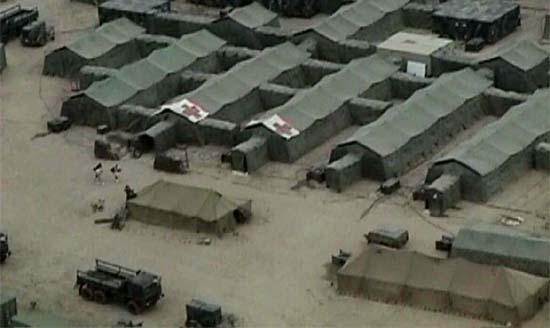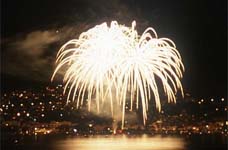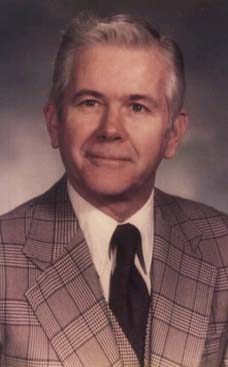
"The fact is, Peace Corps volunteers have always had to take into account safety and security, whether it was health or other issues. Peace Corps has had to leave countries because of instability, but to create this uncertainty, and it will exploited by those who wish to exploit it, the uncertainty as to whether this volunteer is really there as a volunteer is there to help whether 70 or 27, but that lack of certainty about whether they're there are as a Peace Corps volunteer or as military that creates a whole new kind of security problem that Peace Corps has never had to face before and is a serious security problem. "
Mark Schneider and Carol Bellamy discuss the Military Option on WAMU
The Peace Corps in the 21st Century
The Kojo Nnamdi Show
WAMU
August 25, 2005
Excerpt
Kojo: Welcome to the Kojo Nnamdi Show. Fresh faced college grads planting trees and teaching English, that's what most people think of when you say the words "Peace Corps," and that image of young people putting America's best face forward appeals to many people. But how does President Kennedy's Camelot era creation adapt to a more complex world. Today many volunteers are older, their skills are different and the Peace Corps itself is facing new challenges, in particular, a controversial law that allows military recruits to do part of their service as Peace Corps volunteers. So, with the world changing around it, what role does the Peace Corps play in the 21st century. Joining us to have this conversation in our Washington studio is Mark Sneider, Senior Vice President and Advisor on Latin America at the International Crisis Group, that's a nonprofit organization working to prevent and resolve deadly conflicts. He was director of the Peace Corps from 1999 to 2001, served as a Peace Corps volunteer in El Salvador. Mark Sneider, thank you very much.
Sneider: Thank you for having me.
Kojo: Also with us in the studio is John Hale, Principal and Mind West Strategic Communications in Shepherdstown, W.Va. He's a former Acting Inspector General at the Peace Corps. John Hale, thank you very much for joining us.
Hale: Nice to see you.
Kojo: And joining us by telephone is Carol Bellamy, President and CEO of World Learning, a Vermont-based development and international education organization. She headed the Peace Corps from 1993 to 1995 and was until earlier this year the head of UNICEF. She served as a Peace Corps volunteer in Guatemala. Carol Bellamy, Thank you very much for joining us.
Bellamy: Thank you.
Kojo: Mark Sneider, let's start with the current controversy of military service in the Peace Corps. In 2002, under a law that passed, military recruits can do part of their service in the Peace Corps or Americorps. How exactly will this new program work, when will it take effect, and why is it making headline now if it was passed in 2002?
Sneider: Well, the reason it's beginning to be a matter of controversy is because it's suddenly become major campaign recruitment for the military and as a result there has been a lot of publicity about it because many of us feel that it endangers the independence of the Peace Corps in certain ways threatens volunteers as well. The law works in the following way: individual recruits can join for an 8 year military commitment and the last two years of that commitment they can chooses to try and join a national service organization like the Peace Corps. And they still would have to meet the standards of the Peace Corps. The problem is that if they then, while serving their military commitment are, in fact, permitted to be Peace Corps volunteers, it muddies the character, legacy, and independence of the Peace Corps. It goes directly against what President Kennedy argued should be the mission of the Peace Corps, which is not to be part of immediate, day to day foreign policy, but separate program to provide Americans with the opportunity to contribute to development, to give other countries the opportunity to learn who we are by having volunteers in their midst and for having volunteers bring back the knowledge and the understanding of the world at large when they come back home.
Kojo: But Carroll Bellamy, given the difficulties the military is having with recruitment, couldn't it be argued that this is a creative way for the military it addresses its problem?
Bellamy: Well, I suppose it could be argued that it's a creative way for the military to address the problems but I believe it contains serious jeopardy problems for Peace Corps volunteers. I mean, I've seen, over the past few years, looking internationally, at an increasing blurring of the lines between military and political and development and humanitarian and putting at jeopardy the human beings, the lives of people who are serving in development and humanitarian capacities, and that's what the Peace Corps does. So, yes, I think the military gets a good deal out of it, I think the Peace Corps and the Peace Corps volunteers get a raw deal out of it.
Kojo: John Hale, I know the independence of the Peace Corps is important to a lot of people, but there's no denying that the Peace Corps is nevertheless a government agency and therefore part of U.S. foreign policy apparatus, so broadly speaking, what role do you think the Peace Corps should have in U.S. foreign policy or diplomatic efforts?
Hale: Well, to begin with, the Peace Corps has never been independent of the American foreign policy, it is really is a creature of American history as is a lot of what we do. Both idealism and opportunism, it was a creature of trying to address the issue of the Ugly American during the height of the Cold War and has certainly noble aspirations in that regard, but at the same time was always seen as an instrument of trying to export, in a certain way, American culture to the rest of the world, not that we also don't need to have, and this is part of Peace Corps' values as well, understanding of culture around the world. I think the idea of jeopardy for Peace Corps volunteers is a very important and good topic. The fact is that Peace Corps volunteers have been in jeopardy for a variety of reasons over the course of the years with health and security and other problems that the Congress has more recently addressed. And the question of whether or not the character of the Peace Corps's legacy is compromised by bringing in young Americans who are also doing service in the military serves a better discussion. I think it does get to the kind of cultural divide sometimes between the kids of people who go into the Peace Corps traditionally as somewhat liberal and anti-establishment, although that certainly doesn't characterize everyone. And then the stereotype that anyone in the military out of our youth and out of our families across the country would somehow be not cut from that same cloth. So, I would say that the Peace Corps does have a role in American foreign policy and I don't think that foreign countries and populations see it any differently.
Kojo: John Hale is ---- at Mind West Strategic Communications in Shepherdsville, W.Va. He joins us to talk about the Peace Corps in the 21st century, along with Carol Ballamy, President and CEO of World Learning, and Mark Sneider, Senior VP and Special Advisor on Latin America at the International Crisis Group. And we'll take your phone calls if you're interested in joining the conversation with comments or questions at 800-433-8850 or you can send e-mail to kojo@wmanu.org. Mark Sneider, the same question for you.
Sneider: If I could, Kojo, let me comment on that. I think there is a distinction. If you look at the history of the Peace Corps, President Kennedy, when he established the Peace Corps, was an executive order, said clearly 'our Peace Corps is not designed as an instrument of diplomatic propaganda or ideological conflict. And then, ever since, every president, republican or democratic, every secretary of state has issued orders that the Peace Corps should be separate from day to day foreign policy and that there should be no linkage to the military, no linkage to intelligence agencies. The latest that I saw was Secretary Powell a statement in order to the Ambassadors last December which is the same that has gone every four years, which basically says Peace Corps activities must be completely and absolutely separated from intelligence activities and he cited Dean Rusk's first comment, that 'to make the Peace Corps an instrument of foreign policy, would be to rob it of its contribution to foreign policy. The Peace Corps is an opportunity for the nations of the world to learn what America is all about. And today, the Peace Corps continues to fundamental value in terms of contributing to development in the countries where volunteers serve. As you said, in a different era, in a different way, working today on issues of HIV/AIDS, working to bring information technology to contribute to development but also it still has that core second goal of permitting countries the communities where volunteers are trusted to learn about America through volunteers. And that issue where trust is put at risk if that they think in that community that the Peace Corps volunteers might be part of US military. And that's the issue that needs to be focused on.
Kojo: We should mention that we have invited top officials of the Peace Corps to join in this discussion, but they declined. Carroll Bellamy, essentially the same to you, the role of the Peace Corps in diplomatic efforts, in particular in US foreign policy in general?
Bellamy: Well, Mark is giving you A to Z. The Peace Corps is American. These are Americans. I think if you scratch US Ambassadors from the United States, they'd tell you that inc countries where the Peace Corps is it's probably the best thing they've got going in terms of the face of the US, so whether it's official or not official, it plays a role in US policy. It really needs to have its independence, but also want to deal with some of the stereotypes. It isn't just a bunch of leftists. I love the fact that when I was a Peace Corps volunteer I could just go up to the hill in Congress and say that there were seven members of Congress that had been Peace Corps volunteers and four of them were republican. It immediately changed the sense that they could put Peace Corps volunteers in a bottle. The fact is, Peace Corps volunteers have always had to take into account safety and security, whether it was health or other issues. Peace Corps has had to leave countries because of instability, but to create this uncertainty, and it will exploited by those who wish to exploit it, the uncertainty as to whether this volunteer is really there as a volunteer is there to help whether 70 or 27, but that lack of certainty about whether they're there are as a Peace Corps volunteer or as military that creates a whole new kind of security problem that Peace Corps has never had to face before and is a serious security problem.
Kojo: here's Hank in Tacoma Park.
Hank. Hi, Kojo. I'm a former Peace Corps Volunteer. I served in the Philippines in 1968-1969. I am outraged over this policy that will further confuse the role of Peace Corps volunteers. There were a couple in my training group who went to the Philippines and were placed in a village as teachers, except the guy forgot he was in the army reserves and when he tried to attend a reserves meeting he was told by the army that this was impossible and that it was contradictory. They were sent home after an investment of funds made them helpful givers of aid. Often times I'd find people who knew little of the Peace Corps, their assumption was that we were from the CIA, it was tremendous effort to work at their level. This is so incompatible and so wrong.
Kojo: Mark Sneider, there are those that would say that that was 1968 and that there were rumors about the Peace Corps and the CIA. This is not a rumor. Why can't military participate without having the kind of confusion that Hank experienced in the Philippines.
Sneider: You want to maintain that the motivation for the Peace Corps is to serve. Here you're saying part of the motivation is to give two years up. In the countries it's important to be able to say that we have nothing to do with military and that you can have disagreements and we're here to participate in development efforts. That's not going to be able to be done. Every volunteer will be suspect. That means that those volunteers will be in danger.










